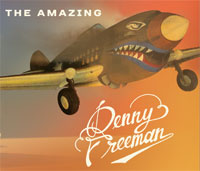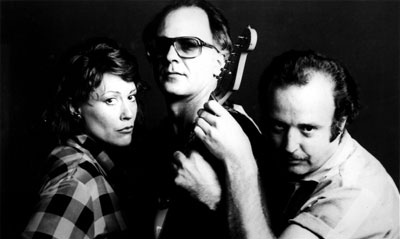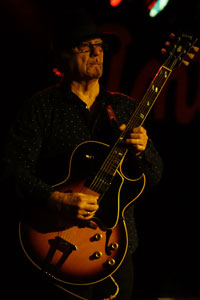Listen/Buy
There is a photograph that comes back to me when I think about the late, great Denny Freeman. It was taken at the Austin Music Awards during South By Southwest in March of 2013.There at the mic stands Gary Clark, Jr., one of the latest and most celebrated guitar heroes to come out of Austin. He is the heir to generations of six-string maestros who have called the Texas capital home. He is a star and he looks every inch the part. Off to the side stands an older bespectacled figure with a Gibson Flying V slung over his shoulder. He is wearing a green shirt under a black sport coat, black jeans, and cowboy boots. Star power? Not exactly, but he exudes a sort of effortless authority onstage.
Younger concertgoers might not have realized it, but there onstage was a microcosm of the Austin guitar hierarchy. Without Denny, might there have never been a Gary Clark, Jr.? Who can say? On the other hand, Gary acknowledged Denny’s elder statesman status and his influence. After his passing, Clark noted on Instagram, “Denny Freeman was always cool the times we got to share the stage or hang out…Honestly, he scared the shit out of me with his quiet confidence and swagger, but I watched this man and would go home inspired every time he would light up a stage. He was like a mysterious superhero to me since I was a kid growing up.” Over the years, Freeman mentored so many younger musicians that he earned the nickname “The Professor.” It’s the kind of legacy you can’t buy.
Denny Freeman died too young, on April 25, 2021 at the age of 76, after a short bout with cancer. Journalist and author Joe Nick Patoski noted his passing and his legacy in a social media post at the time of Freeman’s passing: “(He was) the guitarists’ guitarist in Guitar Town, the thread who defined music in Austin for the past half-century and held it all together. The persona behind all that artistry was as soulful as humans get.”
Freeman was never a marquee name like Stevie Ray Vaughan or Bob Dylan, although he played with both. But he did step out into the spotlight a few times, most notably on the two solo albums he cut for Austin’s Amazing Records label. His first efforts as a frontman, Blues Cruise (1986) and Out of the Blue (1987) showcased Freeman as a master stylist and innovator. Working with a core group of old friends and kindred blues spirits, he dove into a rich Lone Star vein of blues, R&B, and soul and came out with a one-man master class of craft and virtuosity.
Happily, for longtime fans and newbies alike, Freeman’s two albums have been re-released here as a set aptly entitled The Amazing Denny Freeman. The new release includes all the original Amazing recordings along with the tracks from his two singles. Joining Freeman on the album(s) are Austin blues luminaries such as Jimmie Vaughan, Angela Strehli, hornmen Kaz Kazonoff and Joe Sublett, the Fabulous Thunderbirds’ Kim Wilson, the killer rhythm section of drummer George Rains and bassist Sarah Brown, the great guitarist and keyboardist Mel Brown, and more. You are holding in your hands a distillation of literal decades of Austin blues tradition.
Lots of guitarists play like they’re holding a machine gun, spraying notes in every direction. Freeman, in contrast, is a sniper, placing every note precisely on point. “You don’t need to know a lot to play really cool stuff,” he told one young acolyte. “Hell, you can even play just one note, and if you do it with authority, that’s all you need.”
His versatility and precision are on full display in these recordings. From the rumbling hot rod showdown of the opening track, featuring Freeman’s Albert Collins-style icepicking to the closing R&B fanfare of “Takin’ Off,” The Amazing Denny Freeman oscillates through a shifting series of moods and nods to his influences. Here’s a jumping Cajun romp, “Etouffee,” with its nod to South Louisiana melodies. There’s “My Dominique,” a lilting, languid jazz portrait. “Testifyin’,” which features Denny on piano (yeah, he knew his way around the keyboards, too) and Mel Brown on organ, is church music in overdrive, while “Z” is a boogie boogaloo that tips its oversize Stetson to ZZ Top’s stomp ‘n’ roll. “Time for A Change,” with Kim Wilson on vocals and a chorus of horns is a Texas shuffle writ large, and “Delta,” a walking blues with a percussive slide guitar, strikes an ominous, swampy groove. There is, as the showbiz saying goes, a little something for everybody.
It was the early 1970s, a good time to be young and alive in Austin, Texas. Rent was cheap, pretty girls sunbathed topless at Barton Springs, and an ounce of marijuana cost ten bucks. As far as music went, the “cosmic cowboys” ruled the roost, getting the city its first national mention as a music capital. Fiddles and steel guitars sweetened the fusion of rock, country, and folk that permeated the air. Doug Sahm, an Austin aficionado of the first order, dubbed the scene “Groover’s Paradise.”
But there was a group of recent arrivals who weren’t having it. Most of them were from Dallas and instead of digging Bob Wills and Willie Nelson, they took their musical cues from T-Bone Walker, Bobby “Blue” Bland, and Lazy Lester. Tony Lama cowboy boots and Lone Star Beer T-shirts weren’t for them; cats like Denny Freeman, Paul Ray, Jimmie Vaughan (and his little brother Stevie), and Doyle Bramhall all dressed sharp, exuded cool and drew the best-looking women in town to their shows. In various configurations (Storm, Paul Ray and the Cobras, Double Trouble) and in a few funky venues (the One Knite, Soap Creek Saloon, and most crucially, Antone’s, Austin’s 48-year-old “Home of the Blues”), they set about redrawing the template of what “Austin Music” was meant to be.
Denny was integral to it all. Born in Florida in 1944 but raised in Dallas with a host of radio stations pouring blues, Top 40, R&B, and rock into his ears. “In Dallas, blues was part of the landscape. It was on the radio,” he told the Austin Chronicle. But Austin beckoned. “The first day I was here I knew I had to live here,” he said, citing “people living in funky old houses and beautiful girls everywhere…and a sense of community in the air that was for real.”
Freeman would make a change of scenery when he moved to LA in 1992. He wound up winning a Grammy for his work on Taj Mahal’s Shoutin’ In Key album. In 2005, Bob Dylan recruited Denny for his Never-Ending Tour band. He stayed with Dylan for five years and played on his best-selling Modern Times album.
But Austin was home. He returned for keeps in 2011, celebrated and revered as a veteran who had helped transform Austin music and passed the torch to younger players in the process. He kept busy, playing with longtime amigos like Lou Ann Barton and Bill Carter, touching on his vast repertoire of blues, jazz, or rock licks as the occasion demanded. One of his favorite gigs was a longtime Friday residency at a neighborhood South Austin bar, the Saxon Pub. He played that tiny stage with the same aplomb and humble virtuosity he had shown on stadium shows with Dylan. To him, it was all of a piece.
“I feel really fortunate to be a musician,” he told a documentary crew. “I got the opportunity to play with people I never dreamed I would play with and I’ll be eternally grateful for that. It hasn’t been easy,” he added, “but that’s okay.”
John T. Davis
July 2023
Contact the Jungle
[email protected]
512-653-3785





